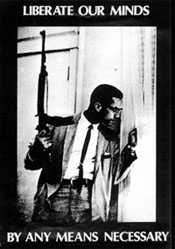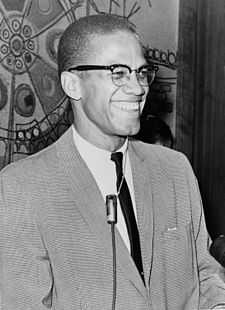By any means necessary

By any means necessary is a translation of a phrase used by the French intellectual Jean-Paul Sartre in his play Dirty Hands. It entered the popular civil rights culture through a speech given by Malcolm X at the Organization of Afro-American Unity Founding Rally on June 28, 1964. It is generally considered to leave open all available tactics for the desired ends, including violence; however, the “necessary” qualifier adds a caveat—if violence is not necessary, then presumably, it should not be used.
Jean-Paul Sartre
The phrase is translation of a sentence used in French intellectual Jean-Paul Sartre's play Dirty Hands:
I was not the one to invent lies: they were created in a society divided by class and each of us inherited lies when we were born. It is not by refusing to lie that we will abolish lies: it is by eradicating class by any means necessary.
Malcolm X
It entered the popular culture through a speech given by Malcolm X in the last year of his life.
We declare our right on this earth to be a man, to be a human being, to be respected as a human being, to be given the rights of a human being in this society, on this earth, in this day, which we intend to bring into existence by any means necessary.
Mandela case
In the final scene of the 1992 movie Malcolm X, Nelson Mandela—recently released after 27 years of political imprisonment—appears as a schoolteacher in a Soweto classroom.[3][4] Yet Mandela informed director Spike Lee that he could not utter the famous final phrase "by any means necessary" on camera fearing that the apartheid government would use it against him if he did. Lee obliged, and the final seconds of the film feature black-and-white footage of Malcolm X himself delivering the phrase.[4]
See also
- The end justifies the means
- By hook or by crook
References
- ↑ "NUMBER: 48220". The Columbia World of Quotations. Retrieved 2007-01-28.
- ↑ Malcolm X (1992). By Any Means Necessary (Malcolm X Speeches & Writings). New York: Pathfinder Press. ISBN 0-87348-754-0.
- ↑ Cunningham, Matthew (3 June 2004). "Creme cameos". The Guardian. Retrieved 2008-10-26.
- ↑ 4.0 4.1 Guerrero, Ed (1993). Framing Blackness: The African American Image in Film. Temple University Press. p. 202. ISBN 1-56639-126-1.
| ||||||||||||||||||||||||||||||
